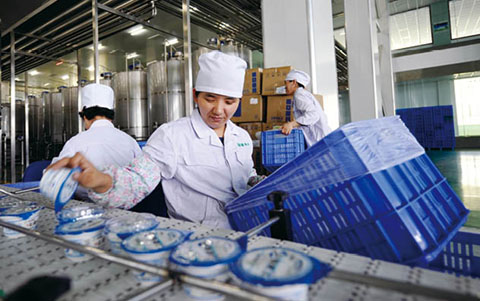Big players to be final winners in dairy sector overhaul
- By Fitch Ratings
 0 Comment(s)
0 Comment(s) Print
Print E-mail Shanghai Daily, November 28, 2013
E-mail Shanghai Daily, November 28, 2013
We expect further consolidation — both horizontally and vertically — in China’s dairy industry, although acquirers might face higher pricing and execution risks as the number of quality targets shrink. Dairy firms will be driven to consolidate by higher demand, tighter raw material supply and stiffer competition.
|
|
|
Big national dairy names with strong brands and robust cash positions will be the ultimate winners in the consolidation process, based on the solid execution of their ongoing acquisitions. |
Restructuring in the industry was initially spurred by a series of food safety breakdowns, including a highly publicized incident in 2008 in which several babies died after consuming infant milk formula contaminated by melamine. However, consolidation, which could help rectify industry misconduct and enhance general food safety standards, didn’t take place immediately after the 2008 melamine incident. The slow pace of industry consolidation was partly due to companies’ reluctance to make acquisitions amid the uncertain demand outlook for domestic dairy products following the scandals, a lack of mature acquisition targets and the long process of negotiation. It was not until last year that industry consolidation took off.
In June 2013, Chinese government said it aimed to reduce the number of domestic milk powder manufacturers to 50 from 127 and nurture 10 large-scale dairy entities with an annual income of over 2 billion yuan (US$328 million) to take over 70 percent of the market in five years. This move demonstrated its resolve to clean up the dairy industry's reputation, avoid more food safety lapses at smaller players and fend off competition from foreign companies, which now account for more than 60 percent of the market compared with less than 30 percent before the 2008 scandal.
Although the dynamics of the milk powder segment are slightly different from the broader dairy sector, the recent consolidation in the infant formula milk powder sector highlights the government’s plan to enhance food safety and boost consumption of local products.
Apart from policy-driven consolidation, the severe shortage of raw milk in China will also likely force companies to step up consolidation along the industry value chain. In 2013, the supply shortage will exceed 4 million tons compared with 1.7 million tons in 2010. And growth in dairy consumption will continue to outpace the increase in raw milk supply. Therefore, to secure high-quality raw milk supply, Chinese dairy players must move upstream either through acquisitions of mature dairy farms or nurturing their own ranches, which usually takes years.
Dairy companies will also seek M&A activity to tap the growing demand from consumers who are more aware of the benefits of milk, who have more spending power and as the government relaxes its one-child policy.
Big national dairy names with strong brands and robust cash positions, such as China Mengniu Dairy, Inner Mongolia Yili Group and Shanghai Bright Dairy will be the ultimate winners in the consolidation process, based on the solid execution of their ongoing acquisitions, although their spending on M&A and expansion may raise funding needs.







Go to Forum >>0 Comment(s)